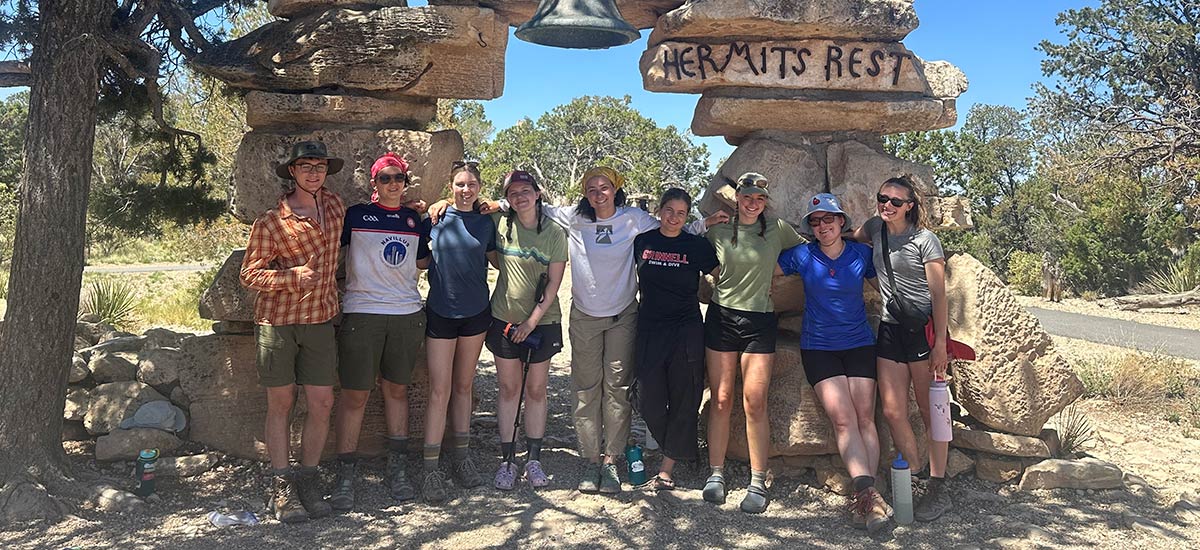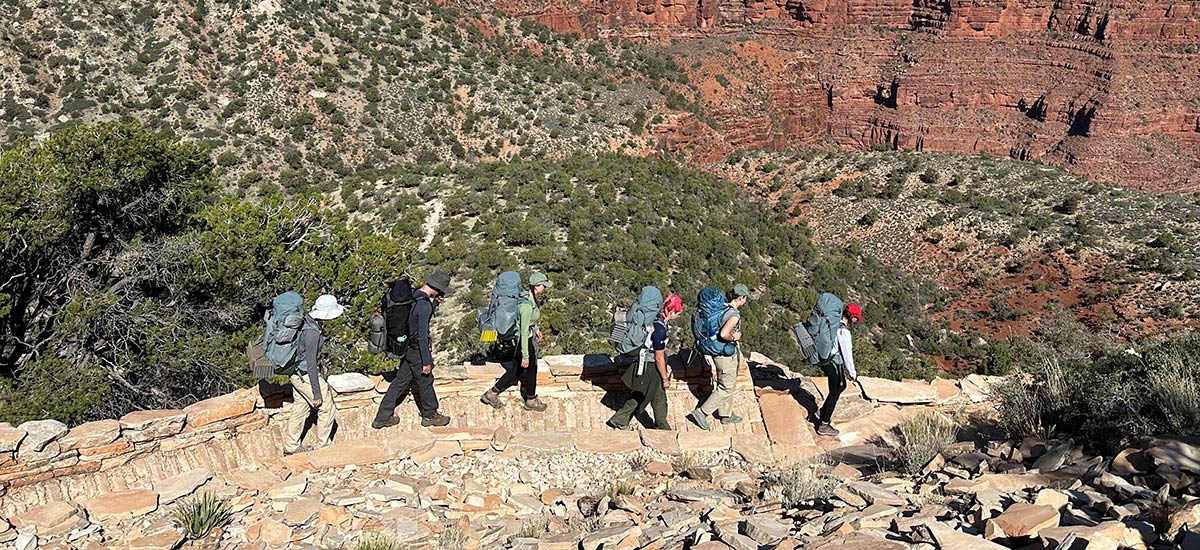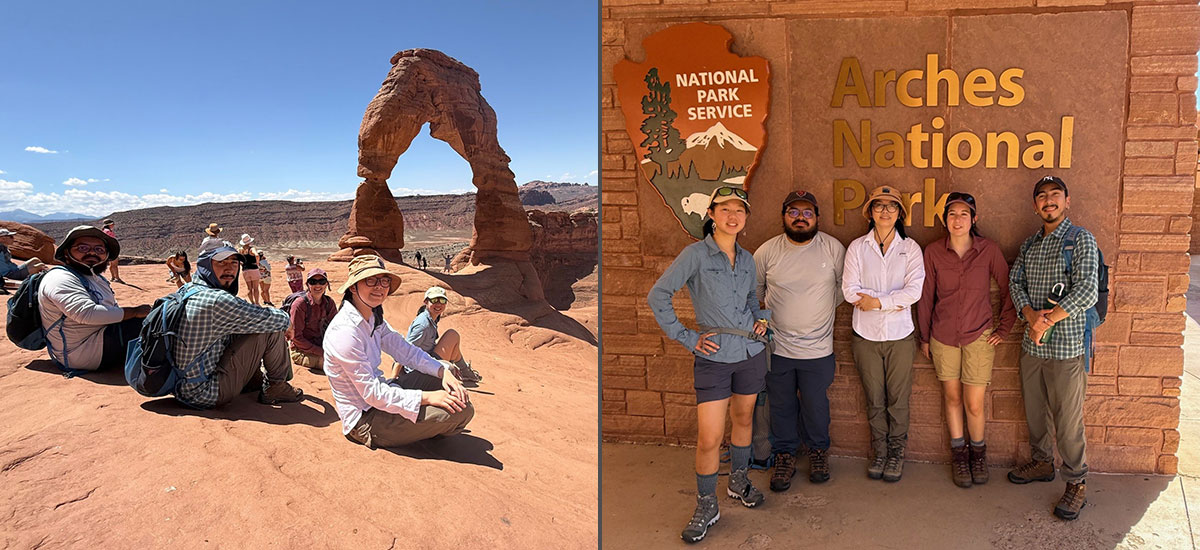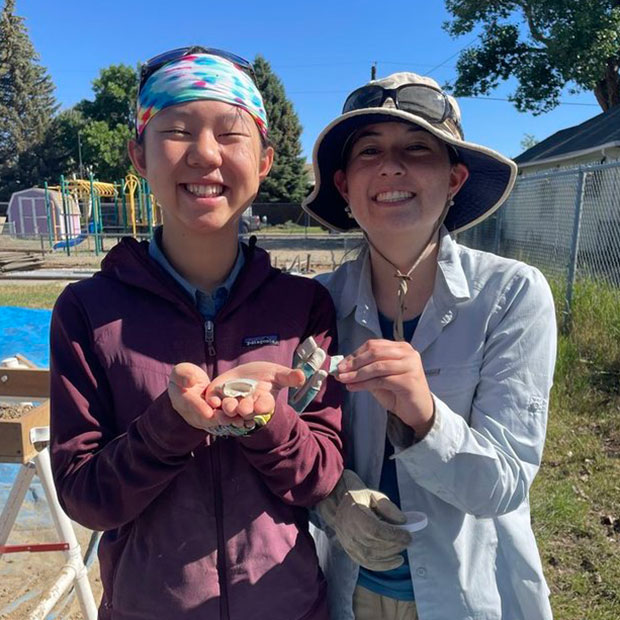Looking back at his student days, Don Marquardt ’70 realized that his “most memorable learning experiences at Grinnell were out in the sunshine getting my hands and boots dirty with other Grinnellians.”
Those memories, which included learning to rock climb at Rock Creek State Park and planting native trees at the Conard Environment Research Station, inspired Marquardt to establish the Four Corners Field Research and Opportunities Endowment Fund to support research, recreation, and internship opportunities specifically in the Four Corners states of Arizona, Colorado, New Mexico, and Utah. Marquardt began his financial support several years ago to supplement income from the endowment, which has allowed students to take trips sooner.
This summer, three different groups of students utilized the Four Corners Fund including a Grinnell Outdoor Recreation Program (GORP) trip to the Grand Canyon, a social justice institute and internship program in Colorado, and a Mentored Advanced Project (MAP) that traveled through the Four Corners en route to an archaeological excavation site in Wyoming. Collectively these experiences contained many dimensions Marquardt envisioned and more.

Just after the end of the school year, GORP Director Amanda Preperato, Head Athletic Trainer Carissa Tigges, and nine students set off on GORP’s biggest trip of the year. GORP trips during the school year tend to be local with break trips to more distant destinations like Illinois’s Shawnee National Forest and Kentucky’s Mammoth Cave National Park.
Taking part in the Grand Canyon trip were Abigail Fantz ’26, Ilem Leisher ’26, Adella Catanzaro ’27, Mariposa Condron ’27, Peyton Dixon ’27, Alexa Hatcher ’27, Bella Kalb ’27, Ava Smith ’27, and Saylor Murphy ’28.
The group started on the rim of the Grand Canyon in “front country” (where you still have access to your vehicle) but spent the bulk of the trip descending into and camping on the floor of the Grand Canyon in back country (where you must rely on bringing only what you can carry with you).
Each day, two students were the hike’s positional leaders and had the opportunity to demonstrate “situational leadership” by adapting to the unique landscape conditions before them. At night, the day’s leaders would get feedback from Preperato and their peers.
“Students felt such a connection to this place,” Preperato says. “It’s so vast. It has a completely different ecosystem than Grinnell and has a unique set of challenges to learn to navigate.” The trip would not have been possible without the Four Corners Fund, she says, and thanks to it “there are endless possibilities for future trips to the Four Corners region.”

Around the same time, Ben Albrecht ’26, Anika Krebs ’26, and Jessenia Ruiz-Arredondo ’26 learned that they’d be able to participate in Colorado College’s summer Social Action Institute thanks to support from the Four Corners Fund. The Institute offers an intensive in-person classroom experience led by Colorado College professor Erik Popkin and concludes by placing students in internships with Southwestern advocacy organizations. “The program really puts theory into praxis,” Krebs says.
All three students traveled to Albuquerque to intern with the New Mexico Immigrant Law Center (NMILC). They participated in “Know Your Rights” trainings and each worked with a partner to support an asylum seeker by preparing “pro se” packets. These packets are narrative, research documents that help asylum seekers represent themselves in proceedings and present their asylum case before an immigration judge. The contents include the asylum seeker’s personal story, any individual evidence to explain why they’re fleeing their home country, and a country condition report to provide the judge background on the situation there. The asylum seekers the students worked with were incarcerated at two private prison facilities, Cibola and Torrance, where NMILC has documented human rights abuses.
Albright, Krebs, and Ruiz-Arredondo were deeply moved by the experiences of coming face-to-face with the immigration system. Ruiz-Arredondo helped a man translate a deportation appeal notice he received so he could understand the renewal filing deadline. In a few weeks, the asylum seekers Krebs and Albright worked with have their hearings on the same day. The students plan to virtually attend the proceedings.
The final project supported this year by the Four Corners Fund was Assistant Professor of Anthropology Laura Ng’s first summer MAP. Ng’s research and archaeological work focuses on the experiences of the Chinese diaspora both in China and the American West including the Chinatowns in Rock Springs and Evanston, Wyoming. In 1885, white immigrant coal miners in Rock Springs killed no fewer than 28 Chinese immigrants and burned the town’s Chinatown to the ground.
Four students from her Archaeological Methods course, Jorge Salinas ’26, Julia Ghorai ’27, Luis Lopez ’27, and Avajane Lei ’28 had the chance to conduct historical archaeology work, which combined interviews and archival research with an excavation.

Over the course of the summer, the students contributed to the “Buried Chinatowns” blog. In one post, Ghorai, documents their experiences including camping in Arches National Park (utilizing GORP equipment), visiting the Dinosaur National Monument, learning about the experiences of Japanese-Americans who were detained against their will during World War II in Denver and Utahraptor State Park, and undertaking an excavation at Rock Springs. In another post, Lopez wrote about a meal with Chuck Leo, one of the descendants of the Rock Springs Chinatown that the students met.
“This summer has been an opportunity I could only dream about going into college,” Lei says.
The summer was reminiscent of the experience of attending what’s called “field school” in archaeology circles. Field schools often require students to spend thousands of dollars out of pocket, which significantly limits who attends. But in this case, the four students were all paid for their work.
“It’s absolutely because of the unique model of Grinnell College that made this possible and increases the diversity of students doing archaeology,” Ng says.
Without funding for MAP research and the Four Corners Fund, Salinas points out, he would have spent the summer working a retail job back home in Rio Grande Valley.
“I’m very appreciative of this funding because it’s supporting students like me who couldn’t afford to be here during the summer,” he says. “Being able to camp, being able to see mountains and regions, it really made me appreciate nature, the Southwest, and what funding like that can do for students.”

Contributing Writer
The archaeology dig conducted by Ng and her four students has generated media attention in Wyoming, including stories in the Cowboy State Daily and on Wyoming Public Radio.
Marquardt says the Four Corners Fund purposely is not named for an individual to promote the possibility of future donations supporting further education in/about the Four Corners/Colorado Plateau and its peoples.
To read more alumni news, check out our news archive and like the Alumni & Friends Facebook page.
Share
733 Broad Street
Grinnell, IA 50112
866-850-1846